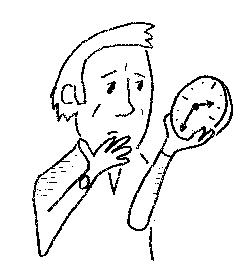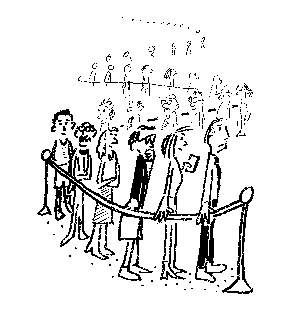
I hate the phrase “killing time.” No one has an overabundance of time here on this earth—the idea of killing any second of it just makes me cringe. In Zen monasteries you often see an old Chinese poem written on the han, the wooden board that’s hit to call people to meditation. It goes like this:
Great is the matter of life and death
Moments go by swiftly and are lost
To squander time is a great shame
Do not waste your life
People have a great variety of definitions for what constitutes time wasting and what doesn’t. Some people want to stay busy and productive every minute. On the other hand, when asked what he thought was the purpose of life, Kurt Vonnegut said, “We’re all just farting around, and don’t let anyone tell you different.” But Kurt Vonnegut accomplished a lot in his time.
Then there are unavoidable situations that seem to suck away our precious time. We get caught in traffic. We’re obliged to visit some really boring relatives. There’s no other choice but to just stand around and wait till the bus arrives, and it’s really, really late.
And what is time anyway? Dogen Zenji said time is existence and existence is time. We aren’t static things that move through time, he said. What we truly are is time itself. I’m one of those who likes to always be busy and productive. Because of this, I’ve often found it difficult to relax. The activities most people do to unwind strike me as time wasters. They accomplish nothing, which, of course, is precisely the point. And I hate that. My meditation practice was a godsend to me because it allowed me to relax while not feeling like I was frittering away precious time.
One common way to interpret the Buddhist commandment not to waste time is to think it means we should always be engaged in some sort of activity directed at accomplishing something. But that goes against another more basic idea in Buddhism, which is that one of the great causes of suffering is being too fixated on goals and accomplishments. So it must mean something else.
I’ve struggled with the idea of goals and accomplishments throughout my years of practice. And I’ve come to the conclusion that Kurt Vonnegut was right—we’re all just farting around. But if we’re really going to fart around in the Buddhist way, we have to fart around as thoroughly as possible. And we also have to know how to embrace boredom and how to love being where we don’t think we want to be.

One of the greatest things my practice has taught me is how to deal with boredom. Excitement is fun. But it’s stressful. We really don’t want all that much excitement. No matter how much we struggle against it, what we honestly want is a pretty boring life. It’s so much easier. I don’t think life is arbitrary. I think everything happens for some reason. And this doesn’t just apply to big things like meeting your future spouse or whatever. It applies equally to every moment in our lives, including the nothing moments.
When I’m stuck in traffic, for example, I try to look at why I might have wanted to be stuck in traffic. I had a lot of time to ponder this when I lived in Los Angeles. When you look at getting stuck in traffic as an opportunity to slow down (literally!), it can seem like more of a blessing than a nightmare. Getting stressed out won’t make those cars go any faster. Finding ways to enjoy it is a lot more rewarding. It makes it feel less like wasting time.
To me, then, the way to not waste time is to find something useful in every moment, no matter what is happening.
Dogen said that we are the eyes and ears that the Ineffable uses to experience the universe. Perhaps God wants to know the feeling of being in line for three hours at the DMV. Who are you to deny him that? In all of the universe, throughout all of time, no one else will be you doing this mountain of dishes on this random Tuesday ever again. It is your sacred duty to open up to that rare and fleeting experience.
But what about the idea of accomplishing something? Many of us who meditate feel driven to reach goals through our practice. Sometimes it’s a big goal like experiencing Unsurpassed Complete Perfect Enlightenment. Sometimes the goal is much smaller, like becoming a better person or learning how to relax or clear our minds. Whatever the desired outcome may be, some of us feel the need to push for it, to get there as quickly as possible.
But that drive for future accomplishment just builds up the habit of always striving for something other than what we have right here and now. The result is that even when we reach our goal, we’re still being driven by those habits to look for the next thing. I’m afraid even Unsurpassed Complete Perfect Enlightenment will never be sufficient if you’ve built up strong enough habits of always seeking something else.
The best way I know of to learn how not to waste time is to practice not wasting time. Every day, set aside a few minutes during which you vow to experience fully whatever comes your way. I’m not saying you should try to concentrate on being “in the moment” (whatever that means). Don’t try to do anything at all except what you’re doing, which will seem like nothing to most observers. Little do they know! Even if what you’re doing is being distracted and hating sitting on your cushion accomplishing nothing—just do that. Don’t try to be anything other than who and what you are. As the old Zen saying goes, “If a clear mind comes, let it come. If a cloudy mind comes, let it come.”
Then you’re not killing time. You’re learning how to make it come alive.
Thank you for subscribing to Tricycle! As a nonprofit, we depend on readers like you to keep Buddhist teachings and practices widely available.